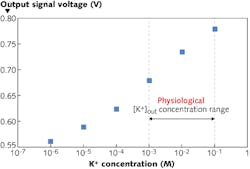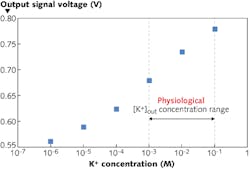Recognizing that antigen–antibody reactions for certain chemical compounds can have weak optical signals that are difficult to detect using fluorescence probes and fluorescence microscopy analysis, researchers at Toyohashi University of Technology (Japan) and the Japan Science and Technology Agency (JST-CREST; Tokyo) have developed an alternative potassium-ion-sensitive image sensor using intensified charge-coupled device (iCCD) technology that can diagnose early stage diabetes and even Alzheimer’s disease.
The image sensor consists of a standard iCCD substrate coated with a potassium ion (K+)-sensitive membrane. The 128 × 128 pixel array covers a 4.8-mm-square image area, resulting in 37-μm-square spatial resolution. The membrane includes plasticized polyvinylchloride (PVC) to trap the potassium ions, input diode and input control gate, transfer gate and floating diffusion region, as well as a reset switch. When a slice of neuronal tissue is placed on the sensor and potassium ions (if present) contact the membrane, the extremely small electric potentials caused by the ion interaction with the film can be measured and displayed as a 2D image, indicating presence of that ion reaction (which for potassium is an indicator of the effects of drugs for diabetes and Alzheimer’s disease). It was also found that microbeads on the surface of the film can increase measurement sensitivity; in addition, the various pixels of the sensor can be configured for specific ion interactions to identify other disease types. Contact Kazuaki Sawada at[email protected].

